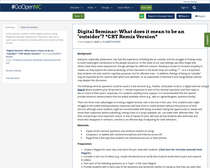NC.DLS.GC.7.b
North Carolina Digital Learning Standards
Grades K-12
Learning Domain: Global Collaborator
Standard: Students use collaborative technologies to work with others, including peers, experts or community members, to examine issues and problems from multiple viewpoints.
Degree of Alignment:
3 Superior
(1 user)
NC.DLS.CC.6
North Carolina Digital Learning Standards
Grades K-12
Learning Domain: Creative Communicator
Standard: Students communicate clearly and express themselves creatively for a variety of purposes using the platforms, tools, styles, formats and digital media appropriate to their goals.
Degree of Alignment:
2 Strong
(1 user)
Learning Domain: Speaking and Listening
Standard: Initiate and participate effectively in a range of collaborative discussions (one-on-one, in groups, and teacher-led) with diverse partners on grades 11--12 topics, texts, and issues, building on others' ideas and expressing their own clearly and persuasively.
Degree of Alignment:
2 Strong
(1 user)
NC.ELA.SL.6.1
North Carolina English Language Arts Standards
Grade 6
Learning Domain: Speaking and Listening
Standard: Engage effectively in a range of collaborative discussions (one on one, in groups, and teacher-led) with diverse partners on grade 6 topics, texts, and issues, building on others' ideas and expressing their own clearly.
Degree of Alignment:
2 Strong
(1 user)
NC.ELA.SL.7.1
North Carolina English Language Arts Standards
Grade 7
Learning Domain: Speaking and Listening
Standard: Engage effectively in a range of collaborative discussions (one on one, in groups, and teacher-led) with diverse partners on grade 7 topics, texts, and issues, building on others' ideas and expressing their own clearly.
Degree of Alignment:
2 Strong
(1 user)
NC.ELA.SL.8.1
North Carolina English Language Arts Standards
Grade 8
Learning Domain: Speaking and Listening
Standard: Engage effectively in a range of collaborative discussions (one on one, in groups, and teacher-led) with diverse partners on grade 8 topics, texts, and issues, building on others' ideas and expressing their own clearly.
Degree of Alignment:
2 Strong
(1 user)
Learning Domain: Speaking and Listening
Standard: Initiate and participate effectively in a range of collaborative discussions (one-on-one, in groups, and teacher-led) with diverse partners on grades 9--10 topics, texts, and issues, building on others' ideas and expressing their own clearly and persuasively.
Degree of Alignment:
2 Strong
(1 user)
Learning Domain: 1.6. Creative Communicator
Standard: Students communicate clearly and express themselves creatively for a variety of purposes using the platforms, tools, styles, formats and digital media appropriate to their goals.
Degree of Alignment:
Not Rated
(0 users)
Learning Domain: 1.7. Global Collaborator
Standard: Students use collaborative technologies to work with others, including peers, experts or community members, to examine issues and problems from multiple viewpoints.
Degree of Alignment:
Not Rated
(0 users)



As a member of the Culturally Relevant Teaching Hub Academy and as a former high school English teacher, I really appreciated and enjoyed the "equity of voice" being addressed in this digital seminar project.
This resource strongly compares multiple perspectives, including traditionally marginalized ones. The resource does not yet present a lens of critical consciousness that also explicitly names why multiple perspectives have been historically excluded. The background specifies that "an exploration of dominant and marginalized cultures may deepen the discussion", but no parameters or methods are outlined for doing so. How is the class defining culture? Is everyone reading the same book? Where is it set? The setting of a work will often define the dominant culture, so a discussion of who is perceived as an "outsider"--which will change based on setting, population, religion, customs, etc. --would establish a richer framework for understanding.
This resource uses analysis to build critical consciousness of power, equality and justice while also valuing the identity of each student; seminar questions that explicitly correlate with each student's identity and concepts of power, justice, and equality would improve the students' experience and enhance the seminar. For example, if you did not identify with a character in the book, what kind of character would you create, and why? How would your character change the narrative or dynamic of the work? How would your character balance or promote a sense of equality and/or justice within the book?
Added a couple of questions to incorporate thinking about how dominant and marginalized cultures can contribute to identifying as an 'outsider'.